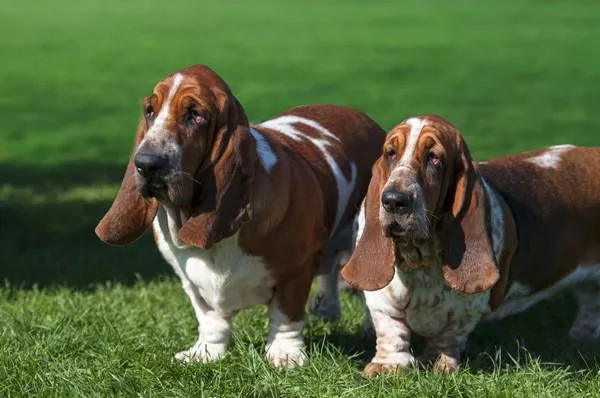Introduction:
Basset hounds are an iconic breed known for their distinctive appearance and keen sense of smell. Originating from France, these low-slung hounds are famous for their long ears, droopy eyes, and, of course, their exceptional olfactory abilities. In this comprehensive guide, we will delve into the world of basset hound scenting capabilities and explore the question, “What do basset hounds smell like?” We will explore the factors that contribute to their unique scent, discuss their specific odors, and address common misconceptions. Let us embark on this aromatic journey to uncover the mysteries of
Understanding the Basset Hound’s Olfactory System:
Before we explore the specific smells associated with basset hounds, it is crucial to understand the fundamentals of their olfactory system. Basset hounds possess a highly developed sense of smell, owing to their well-equipped nasal anatomy. Their large, moist noses contain millions of scent receptors, significantly surpassing the number found in humans. Additionally, they have an olfactory epithelium, a specialized tissue within the nasal cavity that aids in capturing and processing scents. These anatomical features enable basset hounds to detect and discriminate an extensive range of odors with remarkable precision.
Factors Influencing Basset Hound Odors:
Genetics: Genetics play a significant role in shaping a basset hound’s individual scent. The breed’s lineage, specifically the genetic traits passed down from their ancestors, contributes to their distinct odor profile. Although basset hounds do not have a specific odor unique to the breed, genetic factors can influence their scent, such as their skin’s oil production, sweat gland activity, and overall body chemistry.
Diet: A basset hound’s diet can affect their body odor. Like any other dog, their food intake impacts their metabolism and bodily functions, which, in turn, can influence their scent. High-quality dog foods that are nutritionally balanced and free from additives can help maintain a basset hound’s overall health and minimize potential odors.
Hygiene and Grooming: Proper hygiene and grooming practices are essential in managing a basset hound’s odor. Regular bathing using mild, dog-friendly shampoos helps keep their coat clean and odor-free. However, excessive bathing can strip the skin of natural oils and disrupt the skin’s balance, leading to potential odors. It is recommended to consult with a veterinarian or a professional dog groomer to determine the optimal bathing frequency for your basset hound.
Specific Odors Associated with Basset Hounds:
Hound Scent: Basset hounds are known for having a distinct “hound scent.” This odor is not unique to bassets but is a characteristic of hound breeds in general. The hound scent is often described as musky or earthy and is believed to be a result of their natural oils, sweat, and skin secretions. This scent can vary in intensity between individual dogs, with some basset hounds having a more pronounced hound odor than others.
Ear Odor: One of the most prominent features of basset hounds is their long, droopy ears. While these adorable ears add to their charm, they can also contribute to specific odors. Due to their shape and the lack of airflow, basset hound ears are prone to moisture buildup, which can lead to bacterial or yeast infections. These infections can cause an unpleasant odor emanating from the ears. Regular cleaning and routine veterinary care can help prevent and address ear issues and associated odors.
Anal Gland Odor: Anal glands are small sacs located on either side of a dog’s anus, and they play a role in marking territory and communicating with other dogs. Occasionally, basset hounds may experience issues with their anal glands, such as impaction or infection. When this occurs, an unpleasant odor can be detected. If you notice any signs of discomfort or abnormal odor in your basset hound’s anal area, it is crucial to consult a veterinarian for proper evaluation and treatment.
Misconceptions and Myths:
Basset Hounds Smell Bad: One common misconception is that basset hounds inherently smell bad. While they may have a distinct hound scent and may require additional care in certain areas, it is essential to note that basset hounds can be clean and odor-free with proper grooming and hygiene practices. Regular bathing, ear cleaning, dental care, and anal gland expression, if necessary, can help minimize any potential odors.
Basset Hounds Have a Fishy Odor: Another myth surrounding basset hounds is that they have a fishy odor. While some dogs may develop an odor reminiscent of fish, this is not exclusive to basset hounds. The presence of a fishy smell may indicate various health conditions, including skin infections, yeast overgrowth, or dietary issues. It is crucial to consult a veterinarian to determine the underlying cause and provide appropriate treatment.
Conclusion:
In conclusion, basset hounds possess an incredible sense of smell, thanks to their unique olfactory anatomy. While they do have distinct odors associated with their breed, such as the hound scent and potential ear and anal gland odors, it is important to remember that proper care and grooming can help minimize any unpleasant smells. Understanding the factors influencing basset hound odors, including genetics, diet, and hygiene, allows owners to create a clean and comfortable environment for their furry companions. By providing the necessary care and attention, basset hound owners can ensure their beloved pets remain fresh and fragrant.


